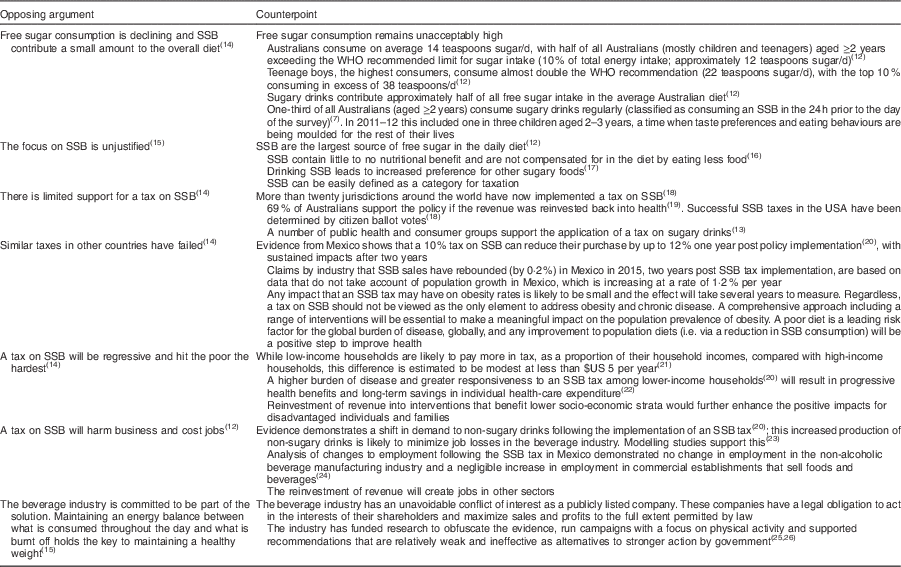An increasing number of countries and jurisdictions around the world have introduced regulatory measures to curb consumption of sugar-sweetened beverages (SSB). In 2017 alone, Portugal, Brunei, Saudi Arabia, United Arab Emirates, Thailand, the Catalan region of Spain and five US cities introduced a tax on SSB, with planned 2018 SSB tax implementation for the UK, the Republic of Ireland, South Africa, Estonia and the US city of Seattle, Washington( Reference Backholer, Blake and Vandevijvere 1 ).
In Australia, a large number of public health, academic and consumer groups now support the introduction of a tax on SSB( 2 ). However, political support has been limited, with only one party – the Greens – developing a policy platform supporting a tax in Australia( 3 ). The intended benefits of an SSB tax are fourfold: (i) an increase in the retail price of SSB would reduce consumption and produce public health benefits; (ii) generation of substantial revenue, which could be reinvested back into public health; (iii) communication of a powerful message that regular consumption of SSB is not part of a healthy diet; and (iv) incentive for manufacturers to reformulate to lower-sugar products (if tax is tied to the amount of sugar contained in the beverage).
Although political momentum for a tax on SSB is growing internationally, it faces stiff opposition by industry. For example, the American Beverage Association spent more than $US 2 million in the city of Berkeley, California and more than $US 9 million in Philadelphia, Pennsylvania opposing an SSB tax( 4 ). Opposing measures included the saturation of cities with anti-tax advertising to sway public opinion against the proposal and filing multiple lawsuits to repeal the tax (with the appeal from the American Beverage Association reaching the state’s Supreme Court in Philadelphia)( Reference Kopp 5 ). While this was not enough to defeat the tax at the ballot box in Berkeley and Philadelphia, industry has worked tirelessly to convince both the public and decision makers that a tax on SSB is poor policy. In Australia, the Australian Beverages Council, the peak lobby group for sugary drink companies, has targeted key politicians and political parties to ‘keep a tax off the policy table’( 6 ). Further they acted to form a ‘sugar roundtable’ made up of groups that could potentially be impacted by a tax, including peak advertising, sugar, cane growers, advertisers and business groups, to actively oppose consideration of a tax by politicians( 6 ).
Two-thirds (63·4 %) of Australian adults and one in four (27·4 %) Australian children aged 5–17 years are classified as overweight or obese( 7 ). Strong scientific evidence, from prospective studies and randomized controlled trials, implicate regular SSB consumption with an increased risk of long-term excess weight gain for both adults and children( Reference Te Morenga, Mallard and Mann 8 ). Consumption of sugary drinks is also a key risk factor for tooth decay in children. In Australia, one in two 12-year-old children presents with dental decay in their adult teeth from free sugar intake( 7 ), of which SSB contribute approximately half this free sugar( Reference Anderson, Dewar and Marshall 9 ). Daily consumption of SSB increases the risk of developing diabetes by 26 % compared with occasional SSB consumers( Reference Malik, Popkin and Bray 10 ) and has been implicated in a number of other non-communicable diseases( Reference Fung, Malik and Rexrode 11 ). Approximately one-third of Australian (aged ≥2 years) reported consuming SSB in the 24 h prior to the 2011–12 National Health Survey, with children and adolescents the highest consumers( 12 ). Despite these alarming statistics, both major political parties in Australia have rejected the idea of an SSB tax.
As countries around the world debate an SSB tax, proponents must be armed with strong and consistent evidence-based arguments that both justify the policy and counter opposing sentiments. This is critical for advocacy efforts to ultimately influence political decisions. While the public health community has been diligent in justifying an SSB tax, consistent counterarguments are often fragmented and incomplete. Here we present the key opposing arguments against an SSB tax (put forth by the Australian Beverages Council) with corresponding counterpoints (see Table 1). While the arguments and counterpoints have been developed from an Australian perspective, these are likely to be transferable more generally across the world, particularly within other high-income countries.
Table 1 Opposing arguments for a tax on sugar-sweetened beverages (SSB) by the Australian Beverages Council and counterpoints

The economic, social and health benefits of an SSB tax are strong. This now is recognized by many reputable health bodies around the world( Reference Veerman, Sacks and Antonopoulos 13 ). No longer can the pursuit of profits be prioritized over concern for the health of our children and young people.
Acknowledgements
Financial support: This commentary received no specific grant from any funding agency in the public, commercial or not-for-profit sectors. Conflict of interest: The authors declare no conflicts of interest. Authorship: Both authors contributed equally to this commentary. Ethics of human subject participation: Not applicable.



